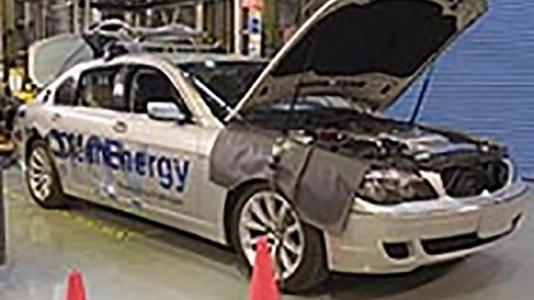Argonne tests find near-zero emissions for BMW Hydrogen 7

ARGONNE, Ill. – Independent tests conducted by engineers at the U.S. Department of Energy’s (DOE) Argonne National Laboratory on the mono-fueled version of the BMW Hydrogen 7 prototype have found that the car’s hydrogen-powered engine surpasses the super-ultra low-emission vehicle (SULEV) level.
“The BMW Hydrogen 7’s emissions were only a fraction of SULEV level, making it one of the lowest emitting combustion engine vehicles that have been manufactured,” said Thomas Wallner, a mechanical engineer who leads Argonne’s hydrogen vehicle testing activities. “Moreover, the car’s engine actively cleans the air. Argonne’s testing shows that the Hydrogen 7’s 12-cylinder engine actually shows emissions levels that, for certain components, are cleaner than the ambient air that comes into the car’s engine.”
It was not an easy task to measure the Hydrogen 7’s emissions. “A gross polluter is easy to measure, but the cleaner the car the harder it is to test,” said Don Hillebrand, director of Argonne’s Center for Transportation Research. “Most labs test at the SULEV level. Argonne’s vehicle testing facilities are unique in that they are able to detect even trace levels of emissions. In this case, it was near-zero emissions.”
After an extensive evaluation by BMW, “Argonne’s Advanced Powertrain Research Facility was found to be the only public test facility in North America capable of testing hydrogen vehicles at these low emissions levels,” said BMW’s Wolfgang Thiel, manager, operating support emissions analysis. “Zero is a very small precise number – we are pushing the boundaries of emissions testing.”
Technical and program information about the Hydrogen 7 tests will be presented by Wallner and BMW North America’s Jason P. Perron Wednesday, April 2, during the National Hydrogen Association Annual Hydrogen Conference, March 30-April 3, in Sacramento, Calif. Argonne will join BMW’s Christoph Huss, senior vice president, science, traffic and vehicles regulations, in a press conference to present the test results during the Society of Automotive Engineers 2008 World Congress, April 14-17, in Detroit.
BMW has put the bi-fueled hydrogen model into limited series production. Although the vehicle is not yet available for sale to the general public, it is being made available to “influential public figures,” whose use demonstrate a new era in clean energy, BMW has said. In the meantime, the greatest challenge to widespread use of hydrogen cars is the limited number of hydrogen refueling stations.
Argonne has conducted cutting-edge transportation research for more than 30 years and employs a multidisciplinary staff of engineers and scientists involved in engine, battery, fuel cell, vehicle systems and applied materials research.
